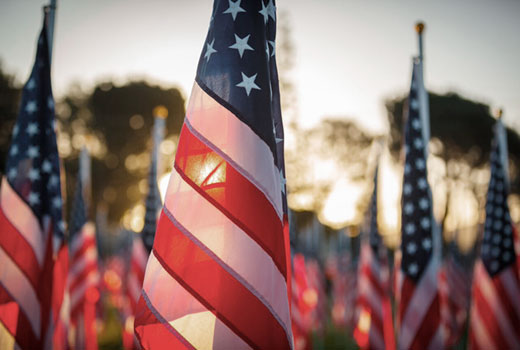In his essay, “The Czar’s Soliloquy,” Mark Twain wrote, “True patriotism, the only rational patriotism, is loyalty to the nation all the time, loyalty to the government when it deserves it.” As we approach our patriotic holiday on July 4, the idea of patriotism is displayed and discussed in our society. But what is patriotism, and is it okay to be patriotic and a Christian simultaneously?
Elton Trueblood said of Abraham Lincoln, “His patriotism was saved from idolatry by the overwhelming sense of the sovereignty of God.” In Paul’s sermon on Mars Hill in Acts 17:26, he emphasized that God “made from one, every nation of mankind to live on all the face of the earth, having determined their appointed times, and the boundaries of their habitation.” The nation we live in is an appointment from a sovereign and almighty God. This realization keeps patriotism in perspective and keeps God’s gracious providence central in our thinking.
Patriotism means devotion to one’s country, loyalty to our country, or defense of our country. It can be emotional and expressive, or quiet and contemplative, but it always has the concept of devotion coupled with an appreciative attitude toward the nation. While patriotism can be displayed through flags, songs, ceremonies, tributes, gatherings, etc., the best kind of patriotism is rooted in devotion, respect and thankfulness.
The kind of patriotic spirit that is most vibrant is the one that reflects the foundation and ideals of freedom. Our founding fathers reflected a biblical influence that guided their thinking, resulting in documents committed to freedom — like the Constitution, the Declaration of Independence, and the Bill of Rights. They emphasized that we have certain inalienable rights like life, liberty and the pursuit of happiness, which are not bestowed to us by government but by our Creator.
Lawrence W. Reed, president of the Foundation for Economic Education, said, “Freedom — understanding it, living it, teaching it, and supporting those who are educating others about its principles. That, my fellow Americans, is what patriotism should mean to each of us.”
John F. Kennedy, America’s 35th president, said, “Let every nation know, whether it wishes us well or ill, that we shall pay any price, bear any burden, meet any hardship, support any friend, oppose any foe to assure the survival and the success of liberty.”
At the core of real patriotism, whether it is found in our nation or in other nations, is the idea of freedom. Throughout American history, the concept of freedom has been a defining hallmark. Our nation is not perfect, but it is our nation. It is still a land of freedom. In times past, we adapted and changed in order to correct a course leading us away from freedom. Some of our freedoms, especially religious liberty, are being threatened today like never before.
During America’s early years, the French writer Alexis de Tocqueville said, “The greatness of America lies not in being more enlightened than any other nation, but rather in her ability to repair her faults.” That is a powerful observation. I hope and pray that statement is proven true in our lifetime.
“God Bless America” is a song, a slice of political rhetoric and a heartfelt desire. That’s what most of us Christians want for our country. Because of the issues we face in this country and a culture that is becoming more and more hostile to the Christian faith, perhaps we should alter that slogan slightly. Maybe our prayer should be, “God Change America” — so that we can more completely be the land of the free, the home of the brave, and a lighthouse for the one true God.

